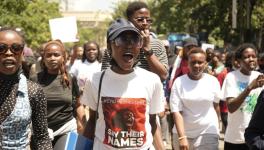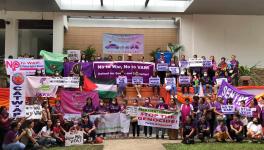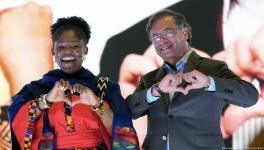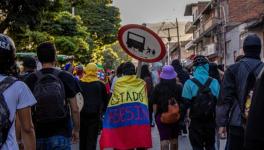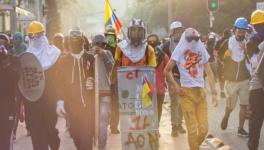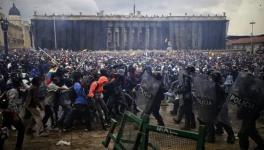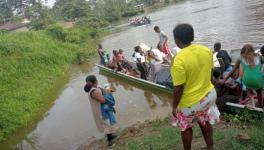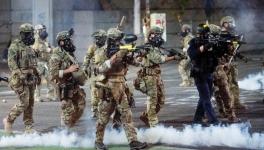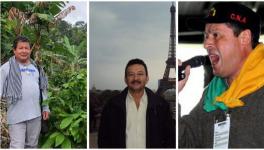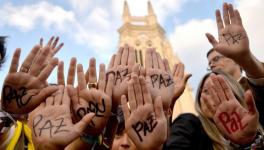Colombians Embark on a Fresh National Strike Against Ivan Duque
On November 19, hundreds of thousands of Colombians began a new national strike in rejection of the social and economic policies of the right-wing government of president Iván Duque as well as the upsurge in violence in the country. Under the banner of “For Life, Peace, Democracy and Negotiation of an Emergency Plan”, workers, peasants, teachers, students, doctors, women, Indigenous and Afro-descendant communities as well as the members of the Common Alternative Revolutionary Force (FARC) party and other left-wing political parties took to the streets across the country to demand greater attention from the national government towards the several issues faced by its citizens.
In the capital, Bogota, several peaceful demonstrations were held. The members of the Colombian Federation of Education Workers (Fecode) protested at the national park. University students marched from the Ean University to the National Pedagogical University. Doctors and healthcare professionals’ associations demonstrated outside the health ministry. The members of the FARC party marched from the Portal de Sur to Plaza Bolivar to join the mobilization by the members of the Central Union of Workers (CUT).
The peasant and rural communities of the Catatumbo region also staged a massive mobilization hitting streets and highways. Residents of the cities of Arauca, Armenia, Barranquilla, Bucaramanga, Cali, Cartagena, Cúcuta, Florencia, Guaviare, Ibagué, Manizales, Medellín, Montería, Pasto, Pelaya, Pereira, Popayán, Quibdó, Riohacha, Santa Marta, Segovia, Sincelejo, Tunja, Valledupar, Villavicencio and Yopal, among others, also held large marches and demonstrations.
The call for the national strike was given by a diverse group of social organizations and trade unions grouped under the National Strike Committee. The strike which began on November 19, involves several days of mobilizations to demand an end to Duque’s anti-people policies and lack of political will to address the urgent and pressing issue of violence against communities in the country.
On November 20, peasant communities have continued the strike. Peasants in Cantagallo, Sur de Bolívar mobilized outside an Ecopetrol (the Colombian state oil company) plant to demand the fulfillment of historic agreements. Members from the National Army and National Police came to where the peaceful protest was being organized to harass community members and take photos.
On November 21, students and teachers from over 10 universities will mobilize in the capital with their set of demands. On November 23, social movements will hold a candlelight march to commemorate the death anniversary of 18-year-old student Dylan Cruz, who was killed by the officials of the Mobile Anti-Disturbances Squadron (ESMAD) during the police repression of the peaceful national strike last year. On November 25, on the occasion of the International Day for the Elimination of Violence against Women, various feminist movements will carry out a march demanding an end to all forms of gender-based violence.
Demands
Members of left-wing political movements and workers from diverse sectors took part in the national strike to demand negotiation of an emergency plan that guarantees a basic income for those coming from vulnerable sections and support for small and medium sized businesses in the face of the economic crisis due to the COVID-19 pandemic. They also demanded the withdrawal of the Decree 1174, which imposes several regressive labor and pension reforms and favors the employers more than the employees.
Teachers and students joined the strike to demand that the national government guarantee safety measures and equipment in public educational institutions before resuming classes in January 2021.
Doctors and other healthcare professionals demonstrated requesting the State’s intervention in the public health system to ensure better working conditions and formalization of jobs for all healthcare workers. They rejected the bill 010 that further deepens the privatization of healthcare in the country.
Peasants and agricultural workers demanded an end to the exploitation of the territories and natural resources by big companies, and an agrarian reform to guarantee the survival of rural and peasant communities and the promotion of food sovereignty and a dignified life.
Indigenous and Afro-descendent communities demanded protection and security for their leaders, and respect and recognition of their rights.
The members of the FARC party called for cessation of assassinations of ex-combatants and compliance with the peace agreements signed between the former government and the Revolutionary Armed forces of Colombia (FARC) guerilla group in Havana, Cuba, in 2016.
Since Iván Duque took office in August 2018, there have been constant mobilizations by diverse sectors in Colombian society. One of the largest of such mobilizations was the national strike which began a year ago on November 21, wherein tens of thousands were on the streets across the country for several weeks to reject anti-worker neoliberal policies, to demand the implementation of prior agreements made by the government with different sectors, an end to the genocide of social leaders, human rights defenders and ex-combatants and the guarantee of basic rights such as education, housing, food, basic services, and employment. The government has yet to meet any of the crucial demands put forth and since this historic strike.
Courtesy: Peoples Dispatch
Get the latest reports & analysis with people's perspective on Protests, movements & deep analytical videos, discussions of the current affairs in your Telegram app. Subscribe to NewsClick's Telegram channel & get Real-Time updates on stories, as they get published on our website.









